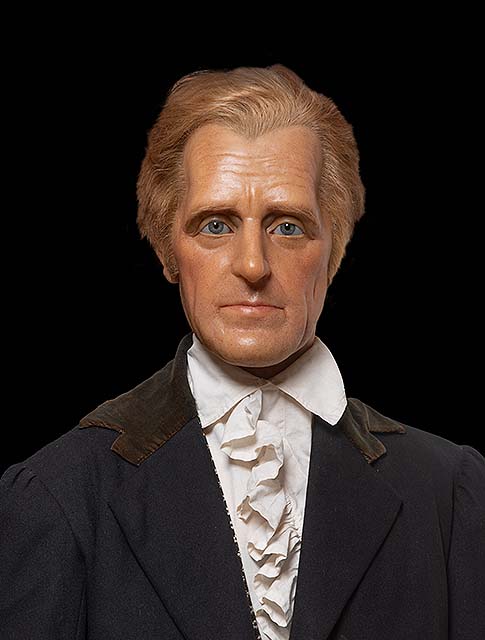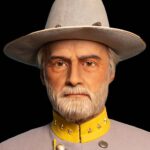Introduction of Andrew Jackson
Andrew Jackson, the seventh President of the United States, served from 1829 to 1837 and is remembered as a figure who sought to represent the common person in American politics. Born in the Carolinas in 1767, Jackson grew up in a backwoods settlement with limited access to formal education. However, in his late teens, he developed a keen interest in law, dedicating two years to reading and studying legal texts.
Jackson eventually became a prominent lawyer in Tennessee, a state where he would later be the first to represent in the U.S. House of Representatives and briefly in the Senate. His career was marked by a fierce temper and an unyielding sense of honor, which led him to engage in several duels, including one fatal encounter with a man who had insulted his wife, Rachel.
Jackson’s rise to national prominence was not solely due to his legal career, but also his military achievements. His decisive victory at the Battle of New Orleans during the War of 1812 earned him widespread acclaim and set the stage for his political ascent. This victory, coupled with his legal career, cemented his position as a national figure. Jackson prospered at his hermitage near Nashville, acquiring enslaved people and building a grand mansion that reflected his success.
As President, Jackson’s tenure was characterized by policies and actions that left a significant and often controversial impact on the nation, including the enforcement of the Indian Removal Act. His legacy is one of a complex leader whose life journey—from humble beginnings to the pinnacle of American power—shaped the course of U.S. history.
Early Years of
Andrew Jackson
Andrew Jackson was born on March 15, 1767, in the Waxhaws region along the border of North and South Carolina. The son of Scotch-Irish immigrants, Jackson faced significant adversity early in life, including the death of his father before he was born. Orphaned by the age of 14, he harbored a deep-seated hostility towards the British after losing his brothers and mother during the Revolutionary War. Despite limited formal education, Andrew Jackson studied law in his late teens and became a successful lawyer in North Carolina by 1787. Moving to Tennessee in 1788, he worked as a prosecutor and eventually established a thriving private law practice. Jackson’s reputation for fierce loyalty and personal honor often led to violent confrontations, including a notorious duel where he killed a man who insulted his wife, Rachel. These early years of Andrew Jackson, marked by hardship and resilience, shaped the future leader who would leave a profound mark on American history.
DID YOU KNOW?
In 1788, he worked as a prosecutor and eventually established a thriving private law practice in Tennessee.
Personal Life of Andrew Jackson
In 1791, Andrew Jackson began living with Rachel Donelson Robards, whom he married in 1794 after her divorce was finalized. Their marriage faced significant public scrutiny and accusations of adultery, which haunted Jackson throughout his political career. Despite the controversies, Jackson’s deep devotion to Rachel was evident. The couple did not have biological children but adopted three sons, including Andrew Jackson Jr. Rachel’s death shortly before he assumed the presidency left him deeply affected and embittered against his political opponents who had attacked her during the campaign. This personal loss profoundly influenced Andrew Jackson’s presidency and his life.
Interesting Facts About Andrew Jackson
Andrew Jackson, often called “Old Hickory” for his brutal and aggressive personality, earned admirers and detractors throughout his life. He was the first president to ride a train, reflecting his engagement with the technological advancements of his time. Remarkably, Jackson survived the first known assassination attempt on a sitting president when both of the assailant’s pistols misfired. His implementation of the “spoils system” advocated rotating government positions among deserving applicants rather than being held by a select few. Despite his image as a champion of the ordinary person, Jackson was a wealthy plantation owner who enslaved people and expanded his holdings during his lifetime. His strong stance during the Nullification Crisis helped to maintain federal authority and dissuaded states from attempting to nullify federal laws. These interesting facts about Andrew Jackson highlight the complexities and contradictions that defined his character and presidency.
What is Andrew Jackson Most Known For?
Andrew Jackson is most renowned for his role in the Battle of New Orleans, which made him a national hero and propelled his political career. His presidency is marked by the enforcement of the Indian Removal Act, leading to the tragic Trail of Tears, where thousands of Native Americans were forcibly relocated. Jackson’s fierce opposition to the Second Bank of the United States culminated in its destruction, which he viewed as a victory for the ordinary person against economic elites. He is also known for extensively using presidential veto power, rejecting more bills than all his predecessors combined. Jackson’s leadership during the Nullification Crisis affirmed the supremacy of federal law over state legislation, maintaining national unity during a period of intense sectional conflict. These aspects of the Andrew Jackson presidency underscore his pivotal role in shaping American history.
What Inspired Andrew Jackson’s Policies?
His belief profoundly influenced Andrew Jackson’s policies in populism and his desire to extend political power to ordinary Americans. His personal experiences, including his rise from humble beginnings and his military career, shaped his distrust of centralized control and economic elites. Jackson’s commitment to preserving the Union drove his strong response during the Nullification Crisis, ensuring that federal laws took precedence over state legislation. His vision of democracy led to introducing the spoils system, aiming to democratize federal officeholding and reward political supporters. The controversial Indian Removal Act reflected his prioritization of American expansionism and settlement despite the devastating impact on Native American communities. These aspects of Andrew Jackson’s policies reveal a complex blend of populist ideals and controversial actions.
How Andrew Jackson Lived Later in Life
After serving two terms as President, Andrew Jackson retired to his plantation, The Hermitage, in Tennessee in 1837. He continued to influence the Democratic Party and national politics through his support for his successors, including Martin Van Buren. Jackson managed his plantation and organized his papers, remaining active in his interests until his health declined. He passed away on June 8, 1845, at 78, surrounded by family and friends. Jackson’s legacy as a fierce advocate for the ordinary person and a controversial figure in American history endures, with his impact on the presidency and national policies continuing to be studied and debated. This Andrew Jackson biography encapsulates the life of a man who left an indelible mark on the American political landscape despite his complexities and controversies.
FAQ'S
Why is Andrew Jackson famous for his presidency?
Andrew Jackson is most known for his role in the Indian Removal Act, his opposition to the Second Bank of the United States,
and his extensive use of presidential veto power.
What were Andrew Jackson’s major contributions to American politics?
Jackson’s political campaigns influenced modern campaign strategies, he was a big supporter of expansion and having territory across all of North America, and he passed the Force Bill which allows a President to use military force if necessary to enforce federal laws.
How did Andrew Jackson impact the United States’ financial system?
He did not trust banks and was highly opposed to the Second Bank of the United States, as he believed it would only benefit the elite and wealthy.
He decentralized banks the banking system and contributed to the Panic of 1837, which caused an economic depression.
What were the key events of Andrew Jackson’s military career?
Andrew Jackson’s achievements in his military career are the battle of New Orleans during the War of 1812, his defense against the Creek Nation during the Creek War, and his position in the Seminole War, which led to acquiring the territory of Florida.
What is the significance of the Indian Removal Act in Andrew Jackson’s presidency?
In 1830, Andrew Jackson signed the Indian Removal act which forced Native Americans to relocate west.
This event is history is known as the Trail of Tears.










